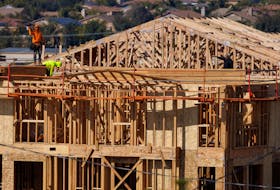CHARLOTTETOWN, P.E.I. - P.E.I. residents won’t be the only ones closely watching Monday’s municipal election results.
The Island’s business community also has a stake in what new municipal mayors and councils in Charlottetown and surrounding areas can do to further their interests.
“We feel that Charlottetown is positioned to continue to grow in areas of economic development, and that will happen with the support of a ‘business friendly’ city hall,” said Penny Walsh-McGuire, CEO of the Greater Charlottetown Area Chamber of Commerce.

On Thursday, the chamber released the results of a survey from 201 members regarding municipal issues in Charlottetown, Cornwall and Stratford.
Of note, 86 per cent said that a three-year capital expenditure plan should be part of the capital budget.
“So people know what’s happening and know what the intention is. There’s always aging infrastructure in cities, and I think it’s good for our community, and particularly the business community, to understand what is being upgraded and what is going to support the vibrancy of the city going forward,” she said.
Also, 67 per cent supported greater transparency and access to information through an online open data portal, according to the survey.
“It’s about ensuring that investors (and) potential businesses can get the information they need to make good decisions about our city and what it offers. But it’s also about transparency for the electorate for residents and businesses about how municipals are best investing money for the future.”
“It’s about ensuring that investors (and) potential businesses can get the information they need to make good decisions about our city and what it offers. But it’s also about transparency for the electorate for residents and businesses about how municipals are best investing money for the future.”
-Penny Walsh-McGuire
Types of information a potential business looking to open or expand in Charlottetown might want include data on residency in a particular area to get a sense of the market or plans to upgrade infrastructure in a part of the city, she said.
Other results included 61 per cent of respondents wanting development applications streamlined, especially as a way to help address challenges such as the housing crisis, while 66 per cent said that it is important for the greater Charlottetown area to have its own economic development agency, especially given the status of the CADC (Charlottetown Area Development Corporation), she said.
The Canadian Federation of Independent Business on P.E.I. also recently surveyed its members about municipal issues in anticipation of Monday’s elections.
In terms of how receptive local governments were to business concerns, 33 per cent in urban areas and 38 per cent in rural areas said governments were unreceptive.
Erin McGrath-Gaudet, CFIB’s director for P.E.I. and intergovernmental policy, also said that development issues, including reducing “red tape” and getting the process for developers streamlined, efficient and predictable, was a priority for new mayors and new city councils to address.
“We do hear frustrations from developers all the time in terms of how long it takes to get through the process. There is such a wild card attached to the process in a lot of cases, whether it is going to be appealed to IRAC (Island Regulatory and Appeals Commission) or is city council going to bend more to the will of the neighbours as opposed to what its own bylaws’ planning agenda is.”
Another issue the CFIB would like to see addressed is the gap between commercial and residential property taxes. She said if a plan that is being discussed to reduce residential taxes is realized, she’d like to see reductions also applied to commercial property taxes.
“We don’t want to see that gap growing. And, ideally, it would be nice if that gap could be reduced as well.”









